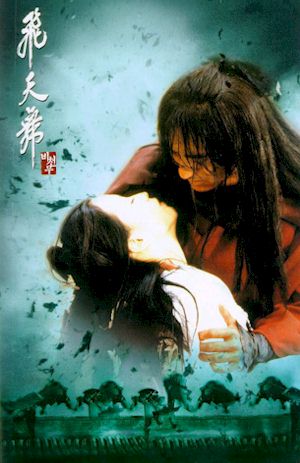|
|
|
|
| |
|
|
| |
|
|
| |
Bichunmoo |
|
|
| |
|
review | availability | |
 |
|
| |
AKA: |
Dance
with Sword |
|
| |
AKA: |
Flying
Warriors |
|
| |
Year: |
2000 |
|
| |
Director: |
Kim
Young-Jun |
|
| |
Producer: |
Jung
Tae-Won |
|
| |
Action: |
Ma
Yuk-Sing |
|
| |
Cast: |
Shin Hyun-June, Kim Hee-Sun, Jang Dong-Jik, Chung Jin-Young,
Kim Hak-Chu, Ki Joo-Bong
|
|
|
The
Skinny: |
Drop The Count of Monte Cristo into the wuxia genre
and add a little Shakespearean tragedy, and you'll have a
pretty good idea of what to expect from this stylish, big-budget
swordplay flick from Korea. |
|
|
Review by
Calvin
McMillin: |
Bichunmoo takes us back
to the days of yore (14th Century China to be exact) to tell
the story of star-crossed lovers Jinha (Shin Hyun-Jun) and
Sullie (Kim Hee-Sun). In a setup similar to The Bride with
White Hair, the young Jinha befriends Sullie after saving
her from a vicious wolf attack. The pair's close friendship
carries on to adulthood, but becomes threatened by the death
of Sullie's mother. This tragic event draws out her long-lost
father, the Mongol general Taruga (Kim Hak-Chu). To the young
couple's dismay, Sullie's father objects to the match and
takes her away, preferring the wealthy Lord Namgung Junkwang
(Chung Jin-Young) as a suitor instead.
Though thought to be of low birth,
Jinha soon discovers that he is the last surviving descendant
of the House of Yu. And as fate would have it, Jinha also
learns that Taruga is the culprit who murdered his parents,
all because he coveted the family's treasured "Bichun
Secret Arts Manual." Much like the Swordsman trilogy's
Sacred Scroll (minus the castration of course!), the manual
provides the keys to true martial arts supremacy.
But at this point, Jinha desires
only Sullie, and after besting her brother in combat, he runs
away with his beloved. Following a romantic interlude in a
cave, the pair is eventually tracked down by General Toruga
and his men. Outnumbered and outmatched, Jinha receives a
chestful of arrows from the Mongul troops, takes a Crouching
Tiger-esque half gainer off a cliff, and falls to his
apparent demise. Soon after, Sullie hastily marries Junkhwang,
bearing him a son. But to everyone's shock (except the viewer's),
Jinha survives the fall, reemerging years later as the enigmatic
assassin Jahalang. With his faithful band of shadowy assassins,
Jinha/Jahalang returns for bloody retribution, leaving ample
amounts of corpses in his wake.
With over an hour left of film, the
movie raises a number of questions. Will Jinha reunite with
the now-married Sullie? Can her love quench his thirst for
vengeance? And what about Sullie's awfully familiar-looking
kid? The answers may not be hard for most audiences to fathom,
but Bichunmoo can at least be applauded for delivering
them in a highly entertaining way.
Still, the movie is not without its
problems. For starters, the movie is pretty darn predictable,
with every "twist" apparent from the start. And
furthermore, the lack of a significant baddie at story's end
really takes away from the finale (Jinha and company mow down
just about every potential "arch-villain" character
before the film's climax).
But to its credit, the film is bolstered
by some impressive cinematography, lots of unobtrusive CGI
wizardry, and excellent performances from its cast. For fans
of Hong Kong cinema, the martial arts sequences are strongly
reminiscent of the wuxia wirework that viewers have come to
love from the early 1990s Hong Kong flicks of Tsui Hark and
Ching Siu-Tung. The homage may seem like straight-up stealing
to some, but for others the sight will be welcome nostalgia.
And in comparison to even the best of those genre flicks,
Bichunmoo is executed in a considerably more polished
manner.
Further praise should go to the wardrobe
department. Though I cannot vouch for its adherence to historical
authenticity, the costume design is truly topnotch. From the
black-garbed assassins to the beautiful ladies, the stylish
outfits of all the characters are so visually compelling that
you don't want to look away (Compare this film to the similarly-themed,
but horribly costumed HK film The Assassin, and tell
me which you'd rather watch). Ultimately though, Bichunmoo
succeeds as a satisfying martial arts romance that made this
reviewer misty-eyed for days gone by. Remember when Hong Kong
regularly put out films like this? Apparently, Bichunmoo's
filmmakers did, and crafted a film that's just as good, if
not better. (Calvin McMillin, 2002) |
|
|
Availability: |
DVD
(Hong Kong)
Region 0 NTSC
Deltamac
Full-Screen
DTS and Dolby Digital 5.1
Korean, Cantonese, and Mandarin Language Tracks
English and Chinese Subtitles
"Making of" Featurette, Music Videos, Trailer |
|
|
|
DVD
(Korea)
Region 3 NTSC
Spectrum DVD
2-Disc Special Edition
16x9 Anamorphic Widescreen
DTS and Dolby Digital 5.1
Korean Language Track
English Subtitles
Audio Commentaries, Deleted Scenes, "Making of"
Featurette
Original Film Soundtrack, Music Video, Trailer |
|
|
|
 |
|
| |
|
image courtesy
of krmdb.com
|
|
|
|
|
|
|
|
|
|
|
|
| LoveHKFilm.com
Copyright ©2002-2017 Ross Chen
|
|
|